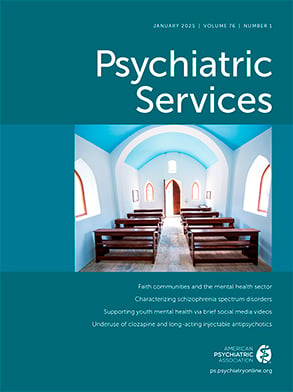Five articles this month examine issues related to the mental health of veterans—in particular, veterans of Iraq and Afghanistan. In the first article, Gerald E. Larson, Ph.D., and colleagues report on diagnoses given to 1,078 American military personnel who sought services at a mental health clinic in an Iraqi war zone. The most frequent diagnoses were anxiety (24%), adjustment (23%), and mood (19%) disorders. Military medical records indicated that 29% of the 1,078 personnel had received a psychiatric diagnosis before they deployed. Because more than half of these diagnoses were received in the nine months before deployment, the authors suggest that a time-based algorithm for deployability may be advisable (
page 15). There are growing concerns that returning veterans with posttraumatic stress disorder (PTSD) are not engaging in needed treatment. Ilan Harpaz-Rotem, Ph.D., and Robert A. Rosenheck, M.D., analyzed data for more than 204,000 veterans who received a new PTSD diagnosis between 2004 and 2007 to determine whether Iraq and Afghanistan veterans are being retained in PTSD treatment at the same rate as veterans from other service eras (
page 22). The third article reports on a sample of more than 300 returning National Guard members and their significant others who were surveyed about mental health symptoms and service use. Lisa A. Gorman, Ph.D., and colleagues found that 40% of the Guard members and 34% of their significant others met screening criteria for one or more mental health problems. Of this group, 53% reported seeking some kind of help. High on the list of barriers was a concern about service use appearing on military records (
page 28). To examine the relationship between mental health and labor force status, Kara Zivin, Ph.D., and colleagues analyzed data from a national sample of users of Department of Veterans Affairs health care. Thirty-five percent were employed, 36% were disabled, 20% were retired, and 7% were unemployed. The study confirmed a strong negative relationship between having a mental disorder and being employed (
page 35). In a sample of nearly 800 veterans who had returned from a combat deployment and who were referred by their primary care provider for a psychiatric evaluation, David A. Adler, M.D., and colleagues found that psychiatric symptoms contributed to a substantial loss in work productivity among employed individuals (
page 39). The Taking Issue commentary, by Debra Lerner, M.S., Ph.D., and Dr. Adler, calls for new service approaches to ensure that adults with depression, including returning veterans, will be able to participate fully in the workforce (
page 3).

